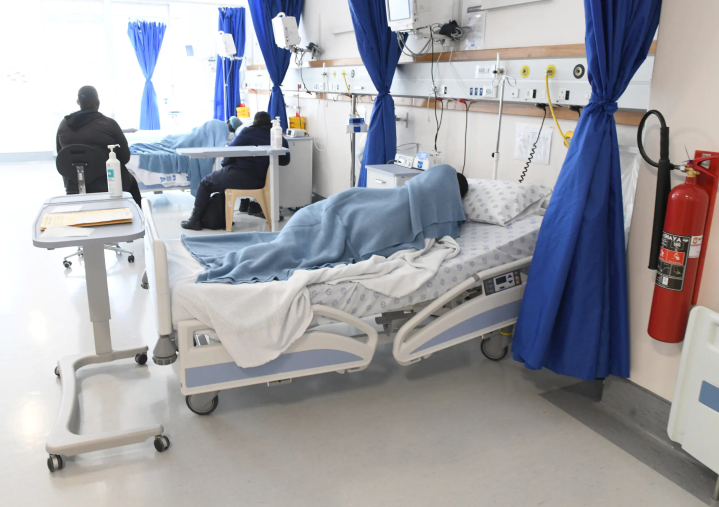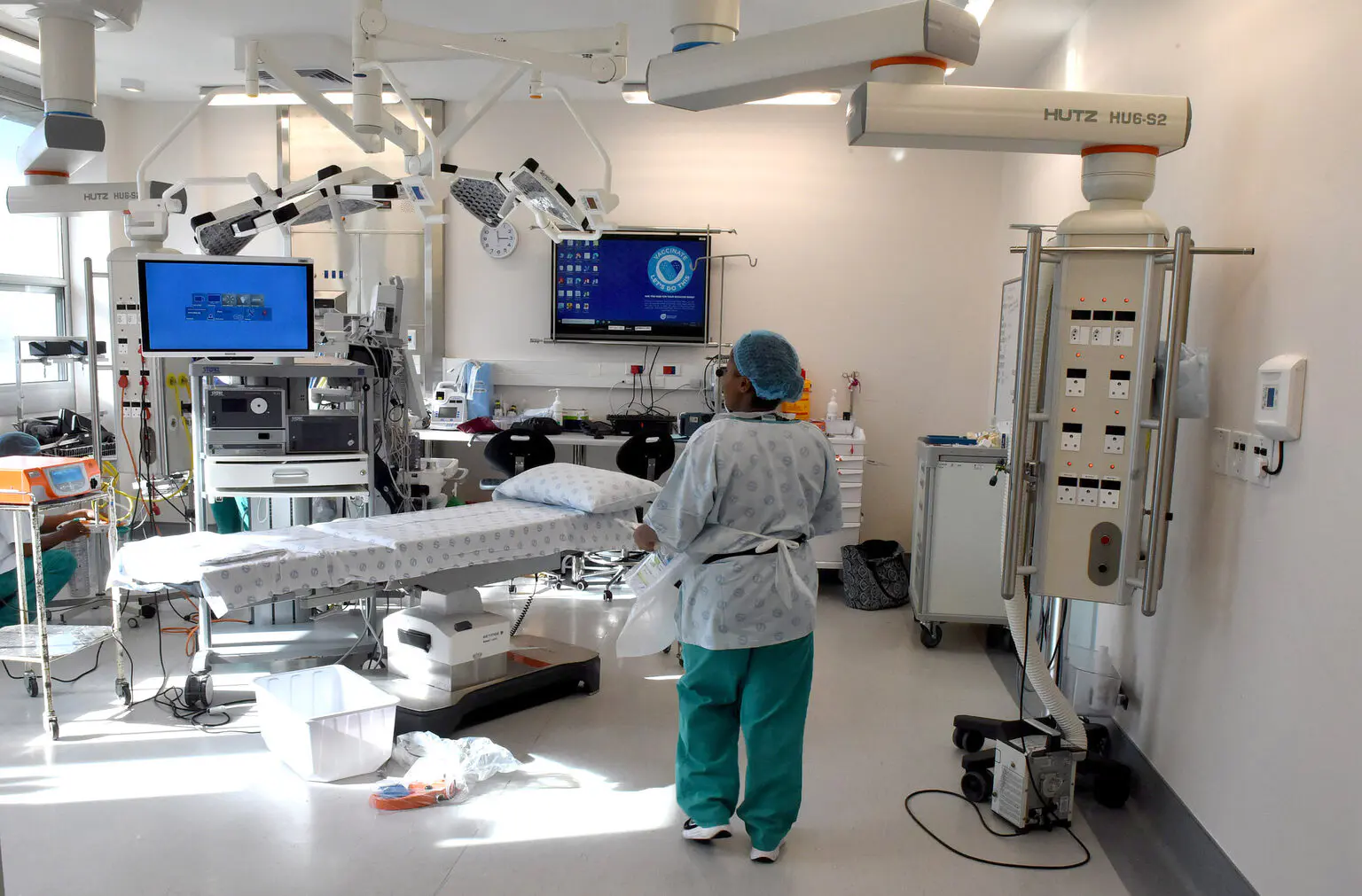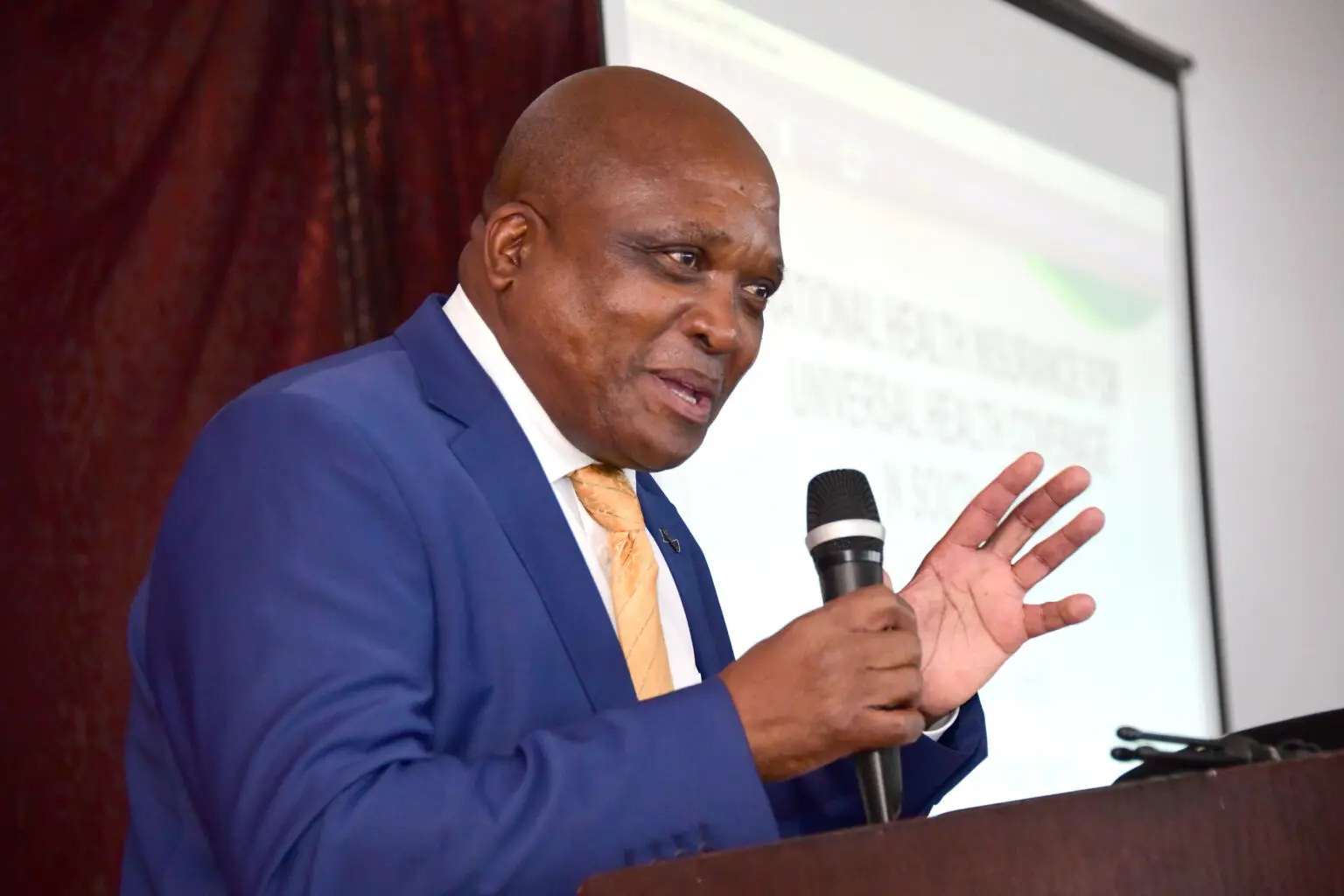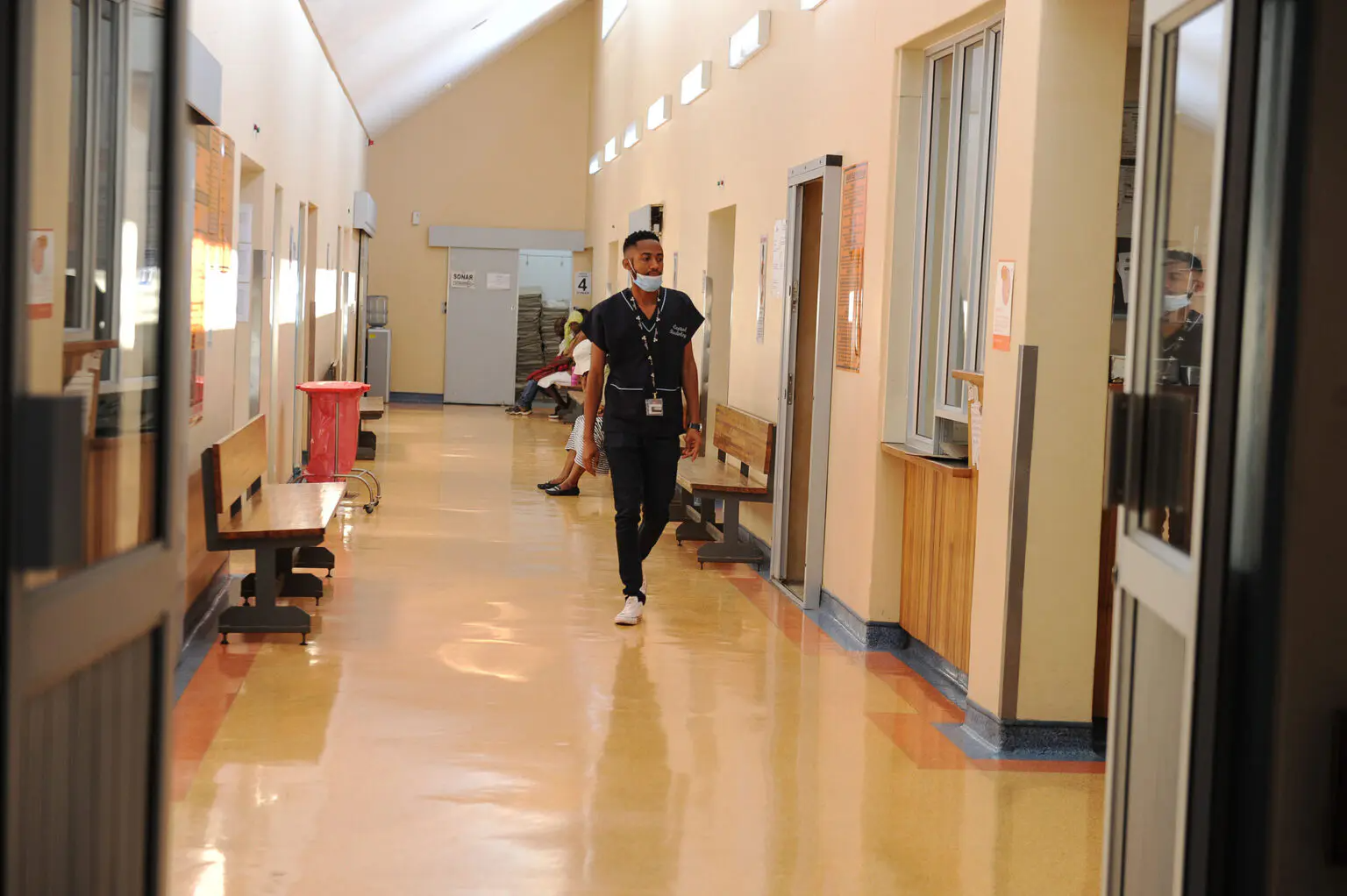SPOTLIGHT
Orthopaedic surgery: What is behind SA’s long waiting lists?

As of last year, 3,449 people were waiting for orthopaedic surgery in five of South Africa’s nine provinces. Waiting times in these five provinces ranged from two weeks to more than five years. In the Eastern Cape, it can take up to 10 years for people to get specific types of orthopaedic surgery. We look at the numbers and unpack what it means for healthcare workers and people waiting for orthopaedic surgery.
According to a response from Health Minister Dr Joe Phaahla to a parliamentary question, 3,449 patients were waiting for orthopaedic surgeries in Free State, Mpumalanga, KwaZulu-Natal, Northern Cape, and Limpopo. These are the most recent numbers Spotlight could find on waiting times for orthopaedic surgery.
The bulk of these are elective surgeries for hip replacements, femur breaks, and arthroplasty (joint replacements).
Public sector orthopaedic waiting lists have made headlines several times in recent years – for example, as with this Spotlight story from 2019 on an orthopaedic crisis in the Free State and this more recent Daily Maverick article on waiting lists in the Eastern Cape.
Waiting times for orthopaedic surgery, which often are not life-threatening emergencies yet can have a profound impact on people’s quality of life and mobility, ranged from a few days to over five years in some provinces, according to the parliamentary response. Spotlight previously published a series on the impact of long surgical waiting lists here, here, and here.
In the Free State, the waiting time for orthopaedic surgery ranges from four weeks for a femur fracture to five years for arthroplasty. In KwaZulu-Natal, the waiting time for orthopaedic surgery ranges from six months to two years, in Limpopo from six months to two years, in Mpumalanga from seven days to one year, and in Northern Cape from two days to three months, according to the Health Minister’s response.

Livingstone Hospital in the Eastern Cape. (Photo: Black Star / Spotlight)
In the Eastern Cape, Health MEC Nomakhosazana Meth, in a written response to a question by DA MPL Jane Cowley in April, said it could take up to 10 years for patients to get some orthopaedic procedures. Meth said at Frere Hospital, it can take up to nine years to get an arthroplasty.
“This is from being placed on the waiting list until being seen in the arthroplasty clinic. The more realistic time is 10 years,” she said. “Currently, the only access to the arthroplasty theatre list is once a month, with three to four joints that can be done per list.” This, she said, was due to budget constraints to buy implants.
The ‘tip of the iceberg’
Putting this into context, Professor Robert Dunn, a consultant spine and orthopaedic surgeon affiliated to the University of Cape Town and Groote Schuur Hospital, says that these surgeries are resource intensive, both in terms of theatre utilisation and implant costs. “There is a massive burden of disease in the ageing population, and our waiting lists are only the tip of the iceberg,” he says.
According to data from the 2019 Global Burden of Disease study, 1.71 billion people globally are living with musculoskeletal conditions. These conditions, encompassing a range of ailments such as lower back pain, fractures and osteoarthritis, contribute significantly to global disability. This growing burden is not only a health concern but also has significant economic implications as more people continue to suffer and become unable to perform day-to-day tasks.

A theatre at Groote Schuur Hospital. (Photo: Nasief Manie / Spotlight)
Dunn explains that orthopaedic surgery mainly deals with the musculoskeletal system – muscles, ligaments, tendons, bones, and joints. “We are focused on the maintenance or improvement of functions related to these structures. It is a rapidly growing field as the ageing population demands ongoing function as well as the trauma load in South Africa.”
Last year, Spotlight reported on a study – the Second Comparative Risk Assessment (SACRA2) by the South African Medical Research Council’s Burden of Disease Research Unit – that showed that interpersonal violence is among the top risk factors for disease and death in the country.
Dunn says cancer and infection may also cause issues requiring orthopaedic attention.
“Trauma may result in fractures (broken bones) which require fixing,” he says, adding that these wait times are relatively short as the patients are hospitalised and prioritised. However, Dunn says they can still wait hours to days due to the overwhelmed public health sector and high trauma loads over short periods, such as weekends and public holidays.
According to him, the typical long waiting lists are for the more elective (planned) surgeries. “These are generally due to ageing pathologies such as osteoarthritis with joint destruction, pain, and stiffness with reduced function such as walking ability. In addition, with painless pathologies such as deformity, for example, teenagers with scoliosis (progressive curved spines) also tend to wait.
“These waiting lists,” he says, “are typically six to 12 months once booked.” However, Dunn says one must realise the patient’s journey is far longer – from referral to day hospital, district hospital, to Groote Schuur (a tertiary academic hospital) before even being booked.
‘An intricate web of health issues’
Professor Jacques du Toit, Head of the Department of Orthopaedic Surgery at Tygerberg Hospital, tells Spotlight that South Africa faces a unique challenge with a quadruple burden of musculoskeletal diseases. In addition to the chronic musculoskeletal burden, he says, “The country grapples with the impacts of endemic violence, trauma, and musculoskeletal pathology arising from tuberculosis and HIV. This intricate web of health issues places a substantial strain on the orthopaedic healthcare system, making effective service delivery an uphill battle.”
According to Du Toit, the team at Tygerberg Hospital’s Division of Orthopaedics faces a daily average of 80 to 100 complex cases requiring emergency operations, in addition to elective procedures across various subspecialties.
“While the quality of care and the staggering number of patients treated daily remains commendable, the sheer workload does cause unfortunate delays and has led to prolonged waiting times,” says Du Toit, adding that the reality is that this musculoskeletal service delivery overload is expected to increase, rather than decrease, in future.
“Stated differently, service delivery overload is here to stay,” he says.
Profound impact on patients
This “service delivery overload” can have a profound impact on patients.
“Patients experience heightened emotional stress due to delays in treatment, potentially leading to decreased satisfaction and [an] impact on outcomes in some cases. Additionally, the overworked orthopaedic personnel may face burnout as they strive to manage the ever-growing demand for their services,” says Du Toit.
According to Dunn, there is little patients can do but wait. “Patients simply just have to wait until their opportunity arises. This has many negative impacts as stated above as well as blocking up clinics with returning patients for review while they wait. This is depressing for healthcare workers. However, this is not limited to SA,” he says.
However, with the long waiting periods, Dunn says the (orthopaedic) conditions generally deteriorate and become more difficult and expensive to operate on – often with poorer outcomes.
“The patients suffer pain for longer periods of time, are often unable to work and lose their jobs in the process,” he says, adding that there is usually not a first-in-first-out principle, but rather a prioritisation based on severity and likelihood of success. “We also look at social factors such as threatened employment,” he says.

Waiting times for orthopaedic surgery, which often are not life-threatening emergencies, can have a profound impact on people’s quality of life and mobility. (Photo: Oldgreentree / Flickr)
Tabudi Madisha, spokesperson for Charlotte Maxeke Johannesburg Academic Hospital (CMJAH) echoes these sentiments. He says the waiting lists have a negative impact on patient care as they prolong the pain and discomfort experienced by patients. Typical waiting time for a total hip or knee replacement at CMJAH is nine months, shoulder surgery is 24 months, and spine deformity (scoliosis) correction is 36 months, Madisha says.
Prolonged waiting lists, he says, may also result in loss of quality of life and if patients are not properly operated on, can result in severe disability in some cases.
“Ideally, orthopaedic patients should be operated on as soon as the need for surgery has been clinically established, especially in orthopaedic trauma patients. For some patients, the patients need to be optimised before they can be operated on to ensure a successful procedure with minimal complications,” Madisha says, adding that these included comorbidities being acceptably controlled, correction of certain physiological abnormalities, and weight loss, among other issues.
Medical negligence and ‘moral injury’
A retrospective review of 1,186 anonymised orthopaedic cases, published in 2011 and covering the period from January 2000 to December 2009, found that spinal surgery was the category of orthopaedic surgery resulting in most litigation, accounting for 11.6% of all cases.
Second most common were the cases in which the patient was deemed to have had an unsatisfactory result (10.5%). Following these were cases of communication problems (6.9%), billing problems (6.6%), missed diagnosis (5%), gross negligence/unavailability (4.7%), medical report problems (3.9%), wrong site surgery (3.5%), failed surgery (3.4%), nerve injury (3.4%), and death (2.7%).
Two critical questions are whether harm due to long waiting times can lead to successful medical negligence claims and to what extent botched orthopaedic procedures add to the ballooning medical claims bills of provincial health departments.

Health Minister Dr Joe Phaahla. (Photo: Elmond Jiyane / GCIS)
Earlier in July, Health Minister Dr Joe Phaahla said in response to a parliamentary question that provincial health departments have paid out more than R4-billion in medical negligence claims over the last three financial years. It is not clear how much of this is due to orthopaedic cases. The last time a breakdown was requested through a parliamentary question about claims for the types of injuries was in June 2022. The department at the time said it still needed to source the information from provinces.
According to Dunn, medico-legal claims are more often for poorly done surgery or negligence rather than waiting lists. “I am unsure of what is ever paid but I do have insight in spinal cord injury cases where there are claims from R15-million [and] up.”
He says these medico-legal claims also weigh heavily on the healthcare workers who still need to perform at their best despite the threat of litigation hanging over their heads.
“Staff are in a difficult position,” Dunn says, “as we are forced to care for all who present, irrespective of time or resource availability. We are under tremendous theatre access pressure, which leads to compromise. It destroys staff morale when they do their best in an overburdened system and then are criticised for doing their best. This has been termed ‘moral injury,’” he says.
According to Du Toit, the challenges faced in the Western Cape are echoed throughout the South African healthcare landscape. He says other public hospitals like Karl Bremer, Khayelitsha, Paarl, and Worcester face similar service delivery pressures. “Despite the difficulties, the orthopaedic units maintain a low rate of medico-legal claims – a testament to the quality of treatment and patient communication provided,” he says.
Way forward
Both Dunn and Du Toit have ideas on how challenges with long waiting lists can be improved.
Dunn says the long waiting lists can be improved with clear political and administrative guidelines on the service priorities based on outcomes that can be achieved. “We should focus on the best return for resource allocation and operate on these groups rather than random all-comers. This, of course, is very difficult as everyone expects the highest level of care, but our tax base cannot afford it,” he says, adding that hard decisions have to be made but the politicians are not prepared to make those decisions.
“On the ground,” Dunn says, “we need more, better-trained nursing staff, [and] allowing longer operating days – that is to use what we have better. At the moment, most theatres only run eight hours a day. This could be increased to 12, but needs staffing. Cost has to be managed, but it is naive to simply add up what we spend on an operation. A large proportion of cost is on complications (when things go wrong), and we need to focus on minimising this. This is multifactorial and includes patient selection, pre-op optimisation, and optimal surgical execution.” He adds that all of this needs close monitoring and the IT systems need to be up to the job.
Du Toit says while the quality of orthopaedic care remains high in the Western Cape Metro East catchment area, service delivery pressures and prolonged waiting times persist as significant challenges.

It destroys staff morale when they do their best in an overburdened system and then are criticised for doing their best. This has been termed ‘moral injury‘, one doctor said. (Photo: Rosetta Msimango / Spotlight)
“The increasing burden of musculoskeletal conditions, combined with the unique challenges of the South African healthcare system, call for innovative solutions to ensure timely access to essential orthopaedic services. As the demand for orthopaedic care continues to rise, addressing these challenges becomes paramount to safeguarding the wellbeing of patients and healthcare personnel alike,” he says.
Meanwhile, when asked for a progress update on surgical waiting lists by the end of last year, Phaahla in a response to a parliamentary question noted that in Limpopo, the health department entered into a “Public-Private Partnership with three private hospitals, wherein some of the elective surgery like hysterectomies, hip replacements, urology, and general surgery cases are conducted for an agreed fee”.
In Mpumalanga, where last year there were 325 orthopaedic cases on the surgical waiting list, the provincial health department managed to appoint some surgeons. At Rob Ferreira Hospital, for example, they appointed a sessional orthopaedic surgeon.
“The number of operating days has been increased to four days a week. Additionally, the orthopaedic team also operates in Barberton District Hospital four days a week,” Phaahla noted in the response. At Ermelo Hospital, they appointed a full-time orthopaedic surgeon in October last year and at Mapulaneng Hospital a full-time orthopaedic surgeon was appointed who also does outreach to surrounding district hospitals. DM
This article was published by Spotlight – health journalism in the public interest.






















 Become an Insider
Become an Insider
Comments - Please login in order to comment.